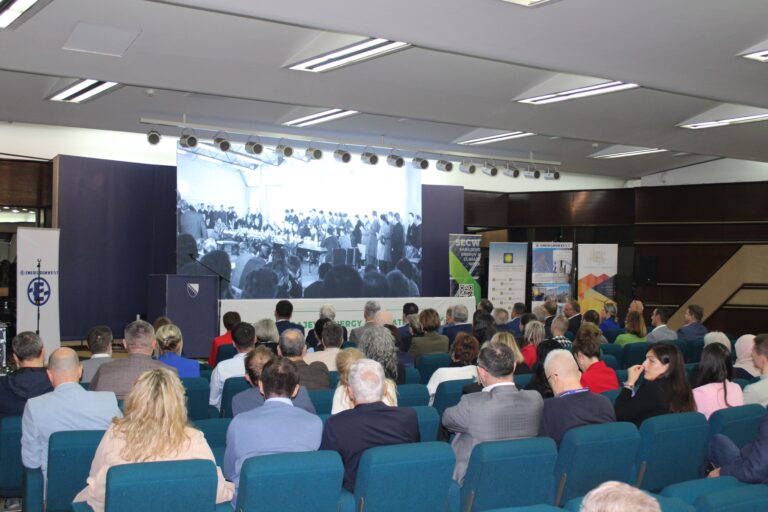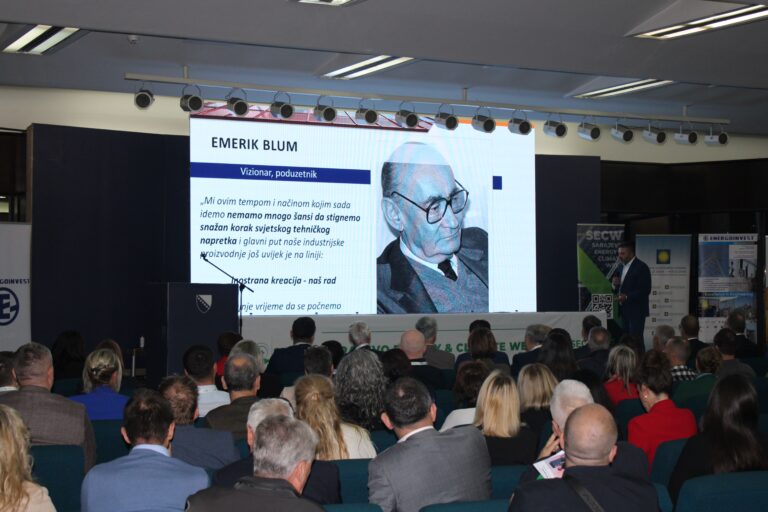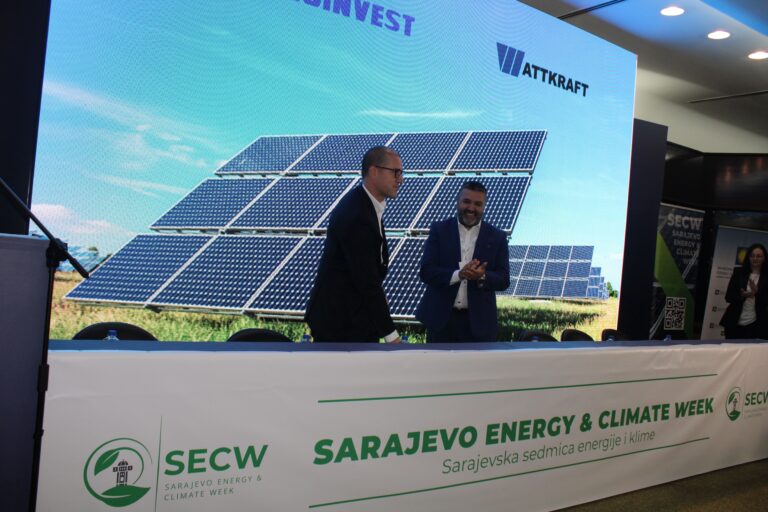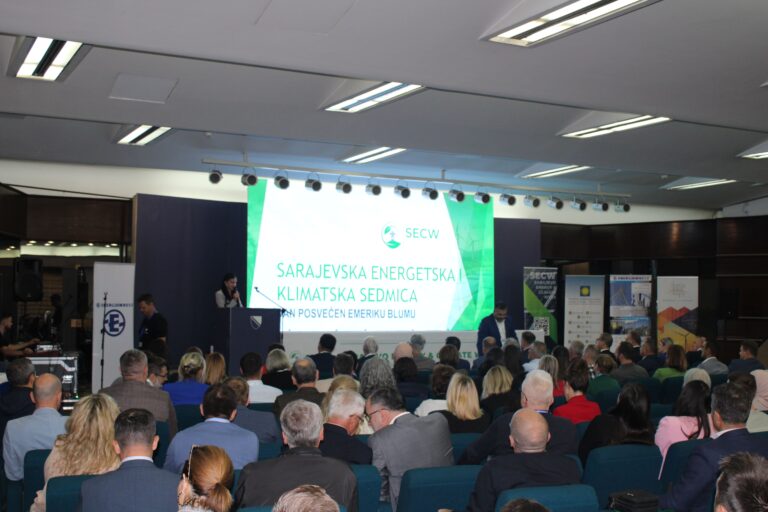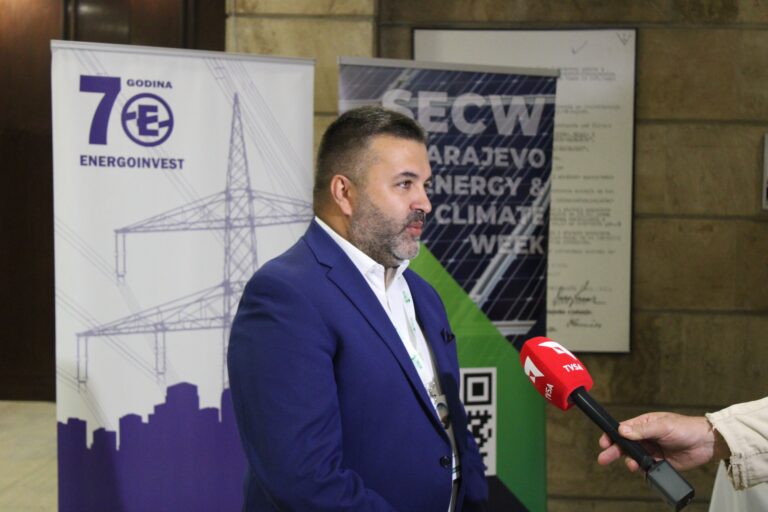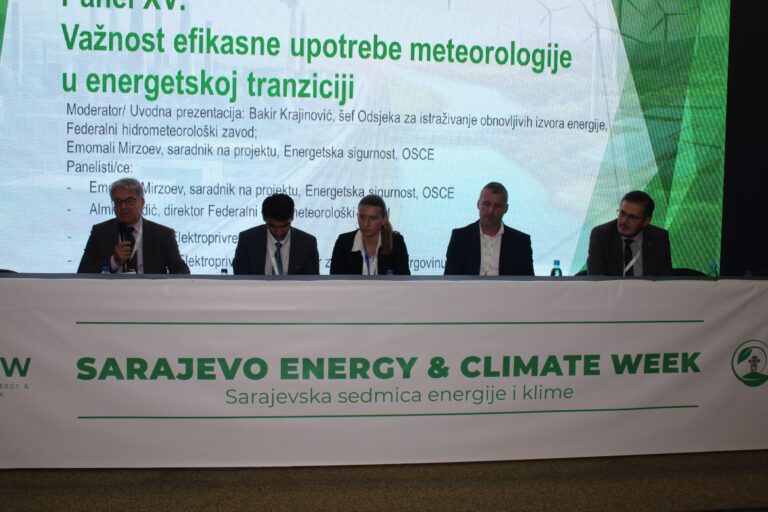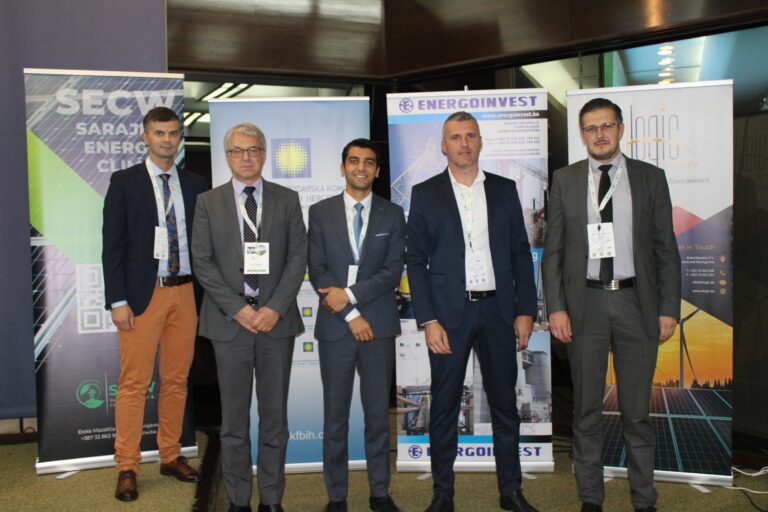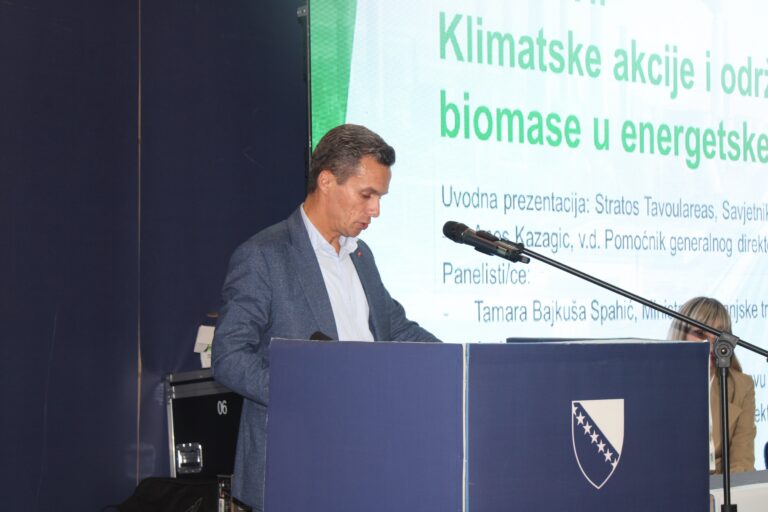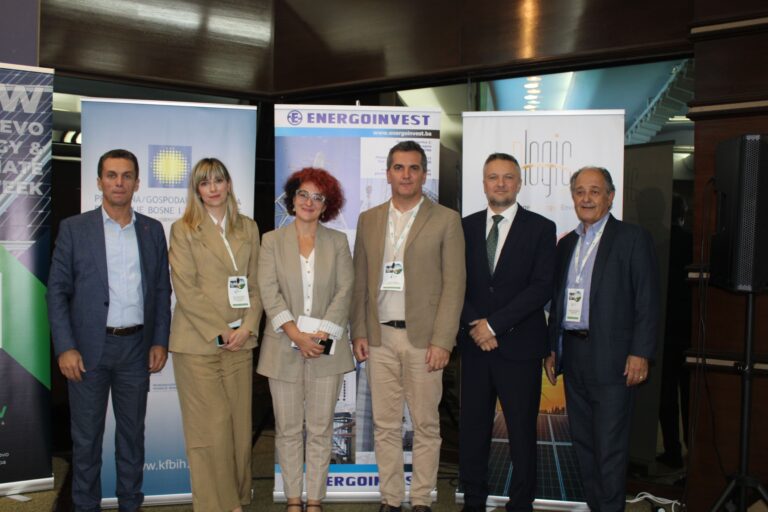SECW 2024
Bulletin of the Day: Thursday, September 26, 2024
The fourth day of SECW was dedicated to the energy pioneer of the region and the world, visionary and exceptional individual Emerik Blum. In his honor, the events were moved to the Energoinvest company, which is also a co-organizer of the Sarajevo Energy and Climate Week.
The fourth day of SECW was opened by Mirza Ustamujić, General Director of Energoinvest d.d. Sarajevo.
“I am very pleased that we are hosting this distinguished event, where we have the opportunity to discuss challenges and opportunities in the field of energy and climate change, and also to present activities that will support our vision for the development of Energoinvest. On this occasion, I am proud to announce that Energoinvest is expanding its activities in the renewable energy sector, and with great enthusiasm, today we have formalized a partnership with the German Wattkraft Group by signing a Strategic Cooperation Agreement,” said Ustamujić.
PANEL XIV: EFFICIENT TRANSMISSION AND DISTRIBUTION NETWORKS AS THE BACKBONE OF THE GREEN TRANSITION
Held as part of SECW at Energoinvest, this panel focused on the crucial role of transmission and distribution networks in the green transition process. The panel was moderated by Nermin Suljanović from the Faculty of Electrical Engineering in Tuzla and the Milan Vidmar Electrical Institute from Ljubljana. The introductory presentation was delivered by Nicolas Heger, project manager for the “Green Agenda: Decarbonization of the Electricity Sector in the Western Balkans” project at GIZ, who emphasized the importance of modernizing energy networks for a more efficient transition to renewable energy sources.
The panelists presented different perspectives from the region and the EU.
- Elvisa Bećirović, Network Access, Management, and Measurement Sector, Elektroprivreda BiH
- Mijo Sesar, Elektroprivreda HZHB
- Jurij Curk, Elektro Ljubljana
- Jagoda Lazetić, Elektroprivreda RS
- Milica Knežević, KfW
- Vladimir Joković, EIB
- Goran Kovačević, CEDIS
- Senad Osmović, Elektroprenos BiH
The discussion clearly demonstrated that the modernization of networks and regional cooperation are key to achieving a sustainable energy future.
PANEL XV: THE IMPORTANCE OF EFFICIENT USE OF METEOROLOGY IN THE ENERGY TRANSITION
The panel addressed the key topic of the role of meteorology in supporting the energy transition. The panel was moderated by Bakir Krajinović, head of the Renewable Energy Research Department at the Federal Hydrometeorological Institute, who also delivered the introductory presentation, alongside Emomali Mirzoev, a project associate for Energy Security at OSCE. They highlighted how accurate meteorological information and forecasts can assist energy companies in optimizing the operation of renewable energy sources, such as wind farms and solar installations.
The panel featured:
- Almir Bijedić, Director of the Federal Hydrometeorological Institute
- Željko Mikulić, Elektroprivreda HZHB
- Muamer Bahto, Elektroprivreda BiH
- Emomali Mirzoev, OSCE
The panelists agreed that the use of advanced meteorological data is crucial for making more efficient decisions in the energy sector, reducing risks, and optimizing resources, which is of great importance for a faster and safer transition to sustainable energy sources.
The topic and conclusions of the panel were prepared and edited by Bakir Krajinović, the moderator:
Two introductory presentations were held: the first titled “The Importance of Efficient Use of Meteorology in the Energy Transition” was presented by Bakir Krajinović, and the second, “Mitigating Climate Change Threats to Critical Energy Infrastructure”, was presented by Mr. Emomali Mirzoev.
Mr. Mikulić emphasized the importance of meteorological services in planning the construction of renewable energy plants, particularly wind and solar power plants. He noted that accurate and timely meteorological data is crucial for determining the feasibility of such projects, helping to assess the potential of wind and sun in different geographical areas. He further highlighted that meteorological services allow for better forecasting of energy production, which contributes to the optimization of grid management and energy storage solutions. According to Mikulić, this data-driven approach improves the efficiency and reliability of renewable energy plants, making it an essential component of sustainable energy planning. He shared that, in their experience, cooperation with meteorological institutions has proven valuable in both the planning phase and in real-time energy production forecasting.
The panel discussion continued with valuable insights on how meteorology can help the energy sector become more resilient, efficient, and capable of supporting the green transition. The participants agreed that incorporating advanced meteorological tools and data into energy production and distribution processes is vital for achieving a successful and sustainable energy future.
Mr. Mikulić provided examples for each type of renewable energy use and highlighted the key data collected by the Federal Hydrometeorological Institute (FHMZ). He also mentioned the segment of water resource management in the context of hydropower plants on the Neretva River, emphasizing the role and significance of meteorological and hydrological forecasts. He concluded that everything begins and ends with meteorology, particularly noting that resource exploration starts with the analysis of meteorological and hydrological data. Energy production is based on forecasts, and the distribution of energy to end-users relies on this data. Therefore, in his opinion, the hydrometeorological service plays a role in all stages, from planning and construction to production and distribution of energy.
The fourth question was addressed to Mr. Mirzoev from the OSCE, asking about the involvement of hydrometeorological services in the “Mitigation Climate Change Threats to Critical Energy Infrastructure” project and the expectations regarding these services’ readiness to respond to challenges.
Mr. Mirzoev pointed out that one of the major challenges in implementing the project is the lack of technical and human capacities in the hydrometeorological services involved. He also noted that the absence of historical data presents an obstacle.
He praised the efforts of hydrometeorological services to become more integrated into decision-making processes in the energy sector. He highlighted that weather forecasts are becoming increasingly reliable and long-term, with data collection now being carried out according to service standards. Sharing this data has become a common practice, and the integration of satellite and ground-based measurements into global databases is more accessible.
He mentioned that the project is tracking these advancements and, with the support of the ARGON laboratory and local hydrometeorological institutes, is working to develop climatological models that will yield results with extremely low resolution. This will be of significant help to the energy sector in the future.
Mr. Mikulić emphasized that all the aspects mentioned—weather forecasts with warnings, continuous atmospheric monitoring—have their place and must be more widely applied in the areas of energy planning, production, and distribution. He elaborated on the specifics for each resource—wind, sun, and water—detailing the procedures and options related to meteorology in this field. He concluded that the measurements they conduct and the products offered by FHMZ will be of utmost importance in the future, particularly in the context of the energy transition.
The sixth question was posed to Mr. Bahto: Is there a current need for meteorological services in the electricity market?
His response began with “Yes, there is a significant need,” which he further explained by noting that energy production from renewable sources greatly depends on weather conditions, which, in turn, affects energy trading. He concluded by expressing hope that, in the near future, there would be more meteorologists playing a role in applying FHMZ data in practice within the context of EP.
The seventh question was addressed to Mr. Mirzoev: How will the project contribute to the stability and security of the entire region, and how will it accelerate the energy transition?
The goal of the project is to provide relevant information and reliable climate modeling products for planning purposes. The aim is to ensure the security and stability of both the energy sector and society as a whole through sound planning. Climate modeling products must be incorporated into plans to align them with expected changes, thereby ensuring easier implementation. He concluded by expressing hope that the results of the modeling will represent a new step in the cooperation between FHMZ and EP in Bosnia and Herzegovina, accelerating the energy transition and ensuring the stability and security of the entire region.
The final question was reserved for Mr. Bijedić: What are the plans of the Institute for the next 10 years, and how can the development of society be monitored to secure FHMZ’s place in the energy sector?
He emphasized the continuation of modernization and equipment upgrades in the area of improving hydrometeorological monitoring, including increasing the number of meteorological stations. He also mentioned the reorganization of climate services to meet the needs of end users, as highlighted at this conference. The introduction of new monitoring methods, such as radar measurements and new products based on radar imagery, was also emphasized. He concluded by stating that FHMZ is open to all users and partners to enhance collaboration and ensure a better future while accelerating the energy transition.
After the questions and answers, it can be concluded:
The role and importance of FHMZ in the energy sector of Bosnia and Herzegovina are not at a sufficient level, and there is both room and a need for improvement, as highlighted by all panelists. The development of the energy sector must be accompanied by FHMZ, and its products should be tailored to meet the needs of EP in Bosnia and Herzegovina so that end users can fully benefit from what FHMZ prepares and delivers. Climate modeling is not yet included in the planning documents of the energy sector, which was recognized by the panelists, and they recommended that information about expected climate changes should be incorporated into the planning documents of the energy sector.
The role of meteorological services in the energy sector is becoming increasingly significant, indicating the need for proactive interaction from both sides. There is a demand for more opportunities such as meetings during the Sarajevo Energy and Climate Week. The conclusion is that the idea of this event addressed the needs of our society regarding climate change, which poses serious risks to stability and security across the entire region.
The panel met expectations and provided answers to key questions in this field.
PANEL XVI: CLIMATE ACTIONS AND SUSTAINABLE USE OF BIOMASS FOR ENERGY PURPOSES
The panel on climate actions and the sustainable use of biomass was held as an important part of SECW, providing insights into the challenges and opportunities related to the use of biomass for energy purposes. The panel was moderated by Azrudin Husika from the Faculty of Mechanical Engineering at the University of Sarajevo, while the introductory presentation was delivered by Stratos Tavoulareas, an energy advisor at the World Bank. Tavoulareas spoke about global experiences in the use of biomass, its advantages, and challenges in the context of reducing greenhouse gas emissions.
Anes Kazagić, acting Assistant Director for Development at Elektroprivreda BiH, followed with local examples, explaining how biomass is one of the key elements in Bosnia and Herzegovina’s sustainable energy strategy.
The panelists were experts from various institutions:
Tamara Bajkuša Spahić, Ministry of Foreign Trade and Economic Relations of BiH and CCAC NFP Amina Omićević, UNDP Bojan Bogdanović, European Bank for Reconstruction and Development Stratos Tavoulareas, Energy Advisor at the World Bank Mersudin Avdibegović, Faculty of Forestry, University of Sarajevo
They discussed current practices, the legislative framework, and opportunities for improving the use of biomass for energy purposes, emphasizing the need for efficient resource management and sustainable practices.
The conclusion of the panel was that biomass, as a renewable resource, can play a key role in climate actions and emission reductions, but continuous efforts are needed in education and infrastructure development for its efficient use.
Prof. Azrudin Husika, the moderator, prepared the conclusions of Panel XVI:
- In EU countries, biomass plays a significant role in the decarbonization process by using the latest technologies with high efficiency.
- BiH has great potential to improve the efficiency of biomass use for energy purposes; with increased efficiency, the biomass currently used could cover a significantly larger final energy demand.
- The use of biomass, especially for electricity generation, depends on the sustainability of biomass as a resource; this issue must be given due attention.
- According to the Integrated Energy and Climate Plan, biomass plays a significant role in the energy security of BiH.
- Biomass should be combined with other energy sources, especially when it comes to heating, such as heat pumps and solar thermal collectors.
- If biomass is used sustainably, it will increase carbon dioxide sinks in BiH, which is a key factor in achieving climate neutrality; in this context, platforms for financing afforestation are particularly useful; this also enables the so-called offset emissions for those emissions that cannot yet be avoided by other measures.
- PANEL XVII: CONSTRUCTION AND CHALLENGES OF CONNECTING SOLAR POWER PLANTS TO THE ELECTRICITY GRID AND BALANCING MANAGEMENT
- The seventeenth panel of this year’s SECW focused on key challenges and opportunities related to connecting solar power plants to the electricity grid, with a particular emphasis on management and balancing. The panel was moderated by Amer Jerlagić, an energy expert, while the introductory presentation was delivered by Prof. Dr. Mustafa Musić from the Faculty of Electrical Engineering at UNSA, explaining the technical aspects of solar energy integration and its role in the energy mix.
- The discussion included experts from various energy institutions. Džemo Borovina from Elektroprivreda BiH spoke about experiences and challenges in connecting solar power plants to the grid in the Federation of BiH, while Mile Međugorac from Elektroprivreda HZHB highlighted the specificities of their network’s operation.
- Senad Aganović from the Energy Regulatory Commission of the Federation of BiH addressed regulatory challenges, while Ali Damadžić from nLogic Advisory, an independent consulting firm in BiH, provided a broader context on the possibilities of optimizing grid management.
- It was concluded that solar energy has enormous potential in the energy transition, but it is essential to improve grid infrastructure as well as legal and regulatory frameworks to facilitate its integration into the electricity system in a sustainable and efficient manner.
SIGNING OF THE STRATEGIC AGREEMENT
During SECW, Energoinvest d.d. and Wattkraft signed an important strategic agreement.
GREEN ENERGY
Energoinvest signs strategic cooperation agreement with the German Wattkraft Group
Energoinvest d.d. Sarajevo, as a partner of the Sarajevo Energy and Climate Week (SECW), was the host of the fourth day of the event, which was held under the slogan “Emerik Blum Day.”
“This natural synergy creates a strong partnership that allows us to jointly implement new technologies, exchange experiences, and educate our engineers, as well as have a significant joint presence, including in the European Union market where Energoinvest is primarily opening markets in Germany, Italy, Spain, Portugal, Belgium, the Netherlands, and Luxembourg,” said Director Ustamujić.
Attila Der, Director of Sales at Wattkraft for Eastern Europe, expressed excitement about the new collaboration.
“We are pleased to announce the collaboration between Wattkraft and Energoinvest d.d., which represents a significant step towards advancing renewable energy in Bosnia and Herzegovina and the surrounding regions. As a leading systems integrator for large solar energy projects, Wattkraft is dedicated to providing state-of-the-art technology and expertise, particularly in the implementation of PV modules and solar systems, thanks to its long history and experience in the sector. Energoinvest brings decades of regional experience and innovation. Together, we look forward to achieving joint success and advancing the energy transition, which will benefit our partners and communities,” said Der.
Read the full article HERE.
The final, 5th day of the 2nd Sarajevo Energy and Climate Week will be held at the Chamber of Commerce of the Federation of BiH, which is also the nominal organizer of SECW.


